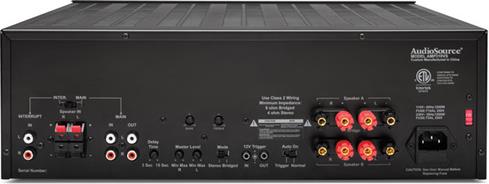A powerful amp with flexible options
Need a ton of juice to drive your power-hungry speakers? The AudioSource AMP310VS power amp combines robust amplification with useful customization and control options. Use it as a standalone amp in a stereo music system. Or connect it to your home theater receiver's zone 2 output to drive speakers in other parts of your house.
Easily play music in two rooms
The AMP310VS is a great amp for setting up a two-room music system. It can drive two separate pairs of speakers connected to its A and B binding posts. Play music indoors through one set of outputs, and listen to the same source outside through the other set. When it's time to come inside for the night, simply switch off the outdoor pair and let the party continue inside.

The AudioSource AMP310VS power amp offers two pairs of high-quality speaker connections.
Lots of power under the hood
At its heart, the AMP310VS is an old-school power amplifier. It offers 150 watts of continuous power per channel when connected to a pair of eight-ohm speakers. It also cranks out 225 watts at four ohms.
Want to bridge the channels and use it as a mono amp for a single speaker? You'll get a whopping 450 watts of clean power from this amp.
Multiple source and power-on options
The '310VS offers two pairs of analog RCA inputs for your music sources, and can switch sources automatically when a signal is detected. It can be set up to automatically turn on when it detects a source, or you can turn it on manually.
This amp is also 12-volt trigger compatible, so you can have it turn on when another piece of equipment is fired up. Rear-mounted bass and treble controls provide tone adjustment for your room.
Never worry about blowing your speakers
One of the features I like the most about the AMP310VS is the ability to set maximum volume limits. These let you set a volume "ceiling" for each channel, so even if some over-enthusiastic listener maxes out the volume knob on the front of the amp, there won't be any damage to the speakers.
This is a great way to make sure that guests or kids don't accidentally turn the system up to distortion levels.






















